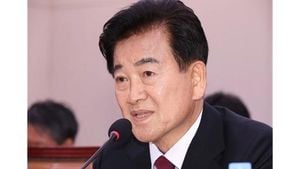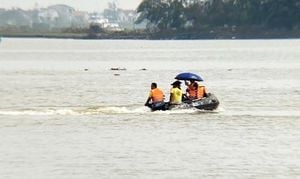The political climate surrounding Morocco has been increasingly dynamic, particularly with respect to its territorial claims over Western Sahara. Recent statements from the King of Morocco during the legislative opening of October 2024 highlighted the nation's firm stance on this contentious issue.
The king declared, "This royal directive is to take the initiative and be decisive and proactive, as it is a victory for rights and legitimacy." This statement not only reflects the Kingdom's commitment to its territorial integrity but also signals its intention to pursue more aggressive diplomatic policies aimed at reinforcing its claims over Western Sahara.
Relations with Algeria have become particularly strained due to the conflicting views on the Sahara issue. The Algerian military regime has opted for isolation tactics, shutting down borders and airspace, exacerbated by rising social discontent within Algeria. There are growing calls from the Algerian populace, demanding accountability and reform as frustrations mount under the current regime.
Internationally, Britain has taken notice of Morocco's efforts, with 2024 witnessing significant gains for Morocco's diplomatic ties. The kingdom has actively sought investments and partnerships across Africa, illustrating its potential as a leader on the continent. Countries like Chile, Malawi, and others have recognized Morocco's stance on the autonomy initiative, reflecting growing global support for the nation's territorial claims.
Moroccan officials assert, "Internationally, more than 80% of the southern population lives under Moroccan sovereignty and has significant representation." This sentiment reinforces the idea of Moroccan identity and legitimacy across the disputed territories.
The historical narrative surrounding Western Sahara plays a pivotal role in this discourse. The Moroccan government has maintained its position emphasizing the continuous historical ties between its people and the Sahara region. Moroccan specialists and economic analysts have noted the significant shifts expected if the consensus around autonomy develops positively.
Economically, Morocco is advancing projects aimed at integrating the Sahara regions more closely with its national economy. These initiatives focus on sustainable development, cultural representation, and human rights, inviting international cooperation.
The unresolved issue of the Sahrawi people's self-determination remains central to this political saga. The Algerian military regime insists on the notion of self-determination through referendum; yet, Moroccan authorities have redirected this debate, citing international loopholes and misinterpretations of such aspirations. They argue, "We must correct the historical error by removing the fictitious state from the African Union's list," implying nations should reconsider the legitimacy of asserting independence through shaky narratives.
Evidence of past colonial aspirations remains pertinent; estimates suggest around 6 million Moroccans globally are committed to safeguarding Moroccan sovereignty. The present-day strategy is about establishing viable ties beyond Western Sahara, illustrating Morocco's strategic pivot toward garnering economic and diplomatic alliances throughout Africa. Any progress made overseas sets the stage for internal acknowledgment of these territorial debates.
Recent developments signal uplifting trends for Morocco’s diplomacy. An international court ruling recognized Moroccan ties to the Sahara. Following significant investments from various states, the region is witnessing increased political and economic activity, spurred by mutual interests. The king’s approach emphasizes collective action with European and American partners committed to maintaining Moroccan sovereignty.
These geopolitical maneuvers are indicative of Morocco's unyielding resolve amid challenges posed by the Algerian military regime, whose historical tactics appear increasingly obsolete. The king's dialogue reflects on the importance of global alliances, stating, "Morocco's sovereignty over the Sahara is based on solid legal foundations, supported by increasing international support," bringing hope to many Moroccans.
Legislators stress the need for comprehensive development programs and accurate representation for the Sahrawi population under Moroccan rule. Numerous meetings have been outlined to discuss investments and projects including energy and infrastructure developments, enhancing the southern regions’ profiles as they emerge as regional hubs.
Citing expert views, Shoji Matsumoto asserts, "Morocco's sovereignty over the Sahara is based on solid legal foundations, supported by increasing international support." His influential commentary aligns with what many perceive as historical facts caught between political maneuvers and outdated narratives.
The combination of domestic support for the king’s initiatives and growing international recognition forms the backbone of Morocco's increasing determination to address the Sahara conundrum with renewed vigor. Future debates surrounding this topic will likely focus on the avenues for continued governance, human rights, and economic empowerment across the disputed territory.
Overall, the current political situation presents Morocco as not only defending its territorial claims but also positioning itself as a resilient player on the international stage. Its enduring focus on autonomy initiatives resonates with partnerships, placing the country steadily on the path toward achieving its diplomatic aspirations.



